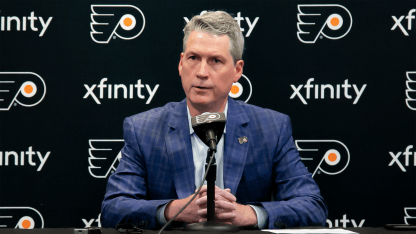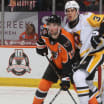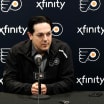Philadelphia Flyers General Manager and President of Hockey Operations Chuck Fletcher met with the local media on Tuesday to discuss the team's highly disappointing 2021-22 season and outlook heading into the offseason.
Fletcher Presser: 5 Takeaways
Philadelphia Flyers General Manager and President of Hockey Operations Chuck Fletcher met with the local media on Tuesday to discuss the 2021-22 season

Here are five key takeaway themes that Fletcher emphasized during the press conference.
1. Search for a new head coach will begin in earnest.
Fletcher started the session by confirming national reports that interim head coach Mike Yeo would not become the Flyers next head coach. He then discussed the next steps that he and the Hockey Operations department will undertake before naming a new head coach.
As Fletcher acknowledged up front, Yeo entered into an extremely difficult situation as he moved from assistant coach to interim head coach following the dismissal of Alain Vigneault. The team was in the midst of what became a 10-game winless streak. Bad habits were rampant. A wave of key injuries -- first-pair pair defenseman Ryan Ellis, first-line center Sean Couturier and second-line center Kevin Hayes were all dealing with significant health issues -- had already hit and would worsen after New Year's, with only Hayes (in mid-March) making a successful recovery that translated to an on-ice uptick before the end of the season.
A strong communicator who was highly respected and well-liked by the Flyers' players, it was Yeo's task first and foremost to try to re-establish more of a winning mindset and clean up a host of problematic issues that reared their head with frequency.
Apart from trying to coax his own team to elevate its level of play, Yeo's increasingly depleted roster had to compete in a division -- and conference -- where it ultimately took 100 points just to be a lower wildcard team. The teams on the top end of the Metro Division and Eastern Conference had superior upper lineup talent and greater depth top-to-bottom than Philadelphia.
Unfortunately, Yeo's team was unable to stop the bleeding.
From Jan. 1 onward, the Flyers had the worst record in the NHL (12-34-5) along with the worst combined special teams (10.6 percent power play, 71.3 percent penalty kill). For the season as a whole, it took a two-PPG performance on the season's final day for the 2021-22 Flyers to avoid the worst single-season power play percentage in the franchise's 55-season history.
"I want to start off with saying that we dealt Mike a really tough hand. He is a good coach and I thought he did a really good job under the circumstances. He kept our players competing and going hard until the end. Made a few adjustments that we started to see some progress in, in particular holding onto the puck a little bit more, zone entries, and scoring a little bit better by the end of the year," Fletcher said .
"It was a tough hand we dealt him, all things considered. He is a good hockey man. We will continue to talk and see how things go over the next five, six weeks. He is the kind of guy we would love to keep in the organization moving forward..... He is free to speak to other teams and what options are there. Depending on how things go over the next six weeks, on his end and our end, I would love to find him an opportunity, whether that is in coaching, player development, front office, or scouting. He is a good hockey man, has a lot of experience and a lot of good ideas. Obviously, he has a lot of firsthand information on our players and the environment."
Fletcher said that he would sit down with the Hockey Operations staff and get to work immediately on narrowing down a long list of potential head coaching candidates to develop a short list. The GM said there was no specific timetable or deadline by which he felt compelled to arrive at a final decision but he is well aware that the hockey calendar -- the NHL Entry Draft (where a host of trade discussions take place and a few get consummated), the start of free agency, etc. -- dictates that an organization has a strategic direction in mind for the roster that includes input from the head coach.
"We are going to get together [on Wednesday], our hockey operations group. The first thing we are going to do is put together an ideal candidate profile. We are going to go through a very thorough discussion on what we are trying to achieve and what we are looking at. At this stage, all options are open. We are just starting the process and once we start that ideal candidate profile, we will start to reach out to candidates who we want to interview," Fletcher said.
Fletcher speaks to media
2. Becoming a better puck possession team is a top priority.
By almost any measure, the 2021-22 Flyers struggled to generate consistent pressure in the offensive zone and, when they did, to finish scoring chances with any sort of consistency. At the other end of the ice, the team scuffled to relieve pressure and move the puck up ice. The numbers weren't pretty: ranked 31st in goals per game (2.56), 27th in goals against average (3.59), 32nd in power play conversion rate, tied for 29th in preventing opposing shorthanded goals (11 SHGA), 26th in penalty killing success rate, a teamwide minus-21 in five-on-five goal differential (160 GA - 181 GA), ranked 27th in 5-on-5 shot attempt differential (46.62 percent Corsi), 26th in all-situation shot attempt differential (47.32 percent), 26th in 5-on-5 expected goals share (46.48%) and 29th in all-situation expected goals share (45.68 percent).
Fletcher said a vital component of the team turning its on-ice fortunes around is to improve -- by a wide margin -- in terms of puck possession. It's an issue that is only secondarily related to systems and more reflective of player personnel and execution.
"We were defending all the time and that is something we have to look at. We were not exiting D-zone well enough. There are certainly things we have to look at in terms of our structure and our details. We didn't have the puck enough and when you defend all the time, bad things happen," Fletcher said.
"Specialty teams were clearly a big issue. At the time we made the coaching change, I believe our PK was tenth or eleventh in the league, so we started well. I think the PK and our goaltending were major reasons why we were hanging around a playoff spot until early December. As the season went on, the PK fell apart and we couldn't keep the puck out of our net. Going back to the process, that is clearly going to be a part of what we are looking to do. We have to defend less and come out of the D-zone better," Fletcher said.
Fletcher said that part of the solution may already be in house. The rest may have to come through off-season upgrades.
"I'd like to think that a healthy Ryan Ellis would help in that regard. He is an elite puck mover. Cam York, I thought, showed some really good signs this year. Ivan Provorov and Travis Sanheim are obviously players that are good with the puck on their stick. I think we have some players that are currently on our roster that can help us get to a better point in that regard, but we are going to take some time in the next few weeks to look at those issues," Fletcher said.
Getting the puck up ice more efficiently is only half of the equation. The other part is what the team does once it enters the offensive zone. There is a large-scale need to improve how the team protects the puck, generates pressure on the forecheck, makes shoot vs. pass decisions, increases the volume of high-danger scoring opportunities and forces opposing goaltenders to make tough saves while preventing rebounds. Fletcher said the long-term absence of Sean Couturier in particular hurt the team from a puck management perspective.
3. Young players vital to success moving forward.
Fletcher said that the severity of the Flyers' struggles in 2021-22 "went a little deeper" than simply being due to injury-related attrition. There is still a need for more top-end talent and for young players on next season's roster to successfully take on expanded roles.
"Young players are going to be a big part of it. If you look at last offseason for example, at that point Morgan Frost was coming off of surgery and we weren't expecting him to be able to make the club. Cam York had, I think, 5 NHL games. Tanner Laczynski was injured. Wade Allison quickly became injured. Tyson Foerster got injured early. A lot of our younger players were not really in the position to compete," Fletcher said.
"We signed veteran players. We signed Derick Brassard, Keith Yandle, Nate Thompson, and picked up Patrick Brown and MacEwen on waivers. We simply didn't have the young depth to compete. A critical part of what we do going forward, whether it is for short-term or long-term success, will be to integrate more youth into our team. I think we are in a way better position this year, hopefully with Allison and Laczynski being healthy and ready to go. Cam York is now much more experienced. Morgan Frost played well down the stretch. We have added Owen Tippett. Noah Cates and Bobby Brink came in. Hayden Hodgson emerged out of nowhere. I didn't even know who he was until October.
"There are a lot of positive signs in terms of younger assets and that doesn't even include the Foresters, [Zayde] Wisdoms, [Elliot] Desnoyers, or [goalie prospect Ivan] Fedotov. The good thing is we will have a lot more depth in terms of young assets. Obviously not all of them can make our team, nor not all of them may be good enough to make our team, but some of them will. That is going to be a big difference next year when we hopefully will have a few more internal options to plug some holes."
4. The Ellis Effect
One of the Flyers' most essential moves last offseason was the acquisition of veteran defenseman Ryan Ellis in a trade with the Nashville Predators. The Flyers entered the season counting on the oft-injured but talented and well-rounded Ellis to provide all of the following: 1) The regular ability to log 21 to 24-plus minutes of all-situations ice time, 2) A steady and reliable right defense partner for Ivan Provorov. 3) High-end ability to trigger breakouts from the defensive zone and make intelligent pinches in joining the attack up ice; 4) Proven ability to not only generate shot attempts up ice but to get his shot attempts through to the goalie (for his career, Ellis has gotten 51 percent of his shot attempts on net), and 5) A stabilizing veteran presence on the bench when things get chaotic as well as in the locker room during times of adversity.
As it turned out, Ellis was injured virtually the entire season. He appeared in the first three games of the regular season, made a one-game return in mid-November and then was out again for the rest of the campaign.
The player was -- and still is -- dealing with what Ellis described during Exit Day last Saturday as a "multi-layered" physical issue that affected the core muscles in and around his entire pelvic region. There were multiple issues; none quite severe enough to require surgery but, in combination, serious enough to make it impossible to do intensive skating let alone play.
There was a trickle-down effect to Ellis' long-term absence. Justin Braun (now with the New York Rangers) had to move up from the blueline third pair to the top pair on a long-term basis. The third pair, meanwhile struggled mightily with Keith Yandle and whomever played the right side.
An offseason rehab regimen has been developed for Ellis; one that the player himself expressed optimism -- which Fletcher echoed in Tuesday's press conference -- would be successful in getting him ready to compete and stay in the lineup next season.
""Multiple MRI's, multiple doctors, multiple different practitioners. Endless. It was just a long year to be honest in every capacity. Being around the guys became tough because I can't play. I can't help. I can't do, and I've never had that problem before. Whether I was out for a week or for a month, it was always 'I'll be back in that month.' Getting the plan and now embarking on it is exciting to me, knowing that I will be back next year," Ellis said.
The next few months will be critical, and will play a central part in how the Flyers prioritize their offseason moves, according to Fletcher.
"The good thing is we're going to see how things progress here over the next four, six, eight weeks and that's what this plan envisions. Some of his treatments. We'll have a pretty good idea where he's feeling by the end of June, early July, and that ducktails well with when the bulk of the offseason activity happens. We'll know a lot more when we get to those pressure points when you have to make decisions, but again, I know he's hopeful and optimistic. The medical people I speak to are confident that he'll be able to come back and be a good player for us," Fletcher said.
Put another way: If Ellis progresses as hoped, the plan for offseason upgrades can focus primarily on adding a notable piece or two to the top end of the forward corps. If Ellis does NOT appear to be on track for a successful return, the top priority may have to revert back to where it was last offseason.
In the bigger picture, Fletcher acknowledged that he is concerned by the rate at which Flyers players who dealt with injuries in 2021-22 too often ended up getting reinjured and had to exit the lineup for a second, often lengthier stint. That is an area the GM said he plans to address .
"I am going to sit down with our doctors, strength staff, and strength and conditioning coach in the next couple weeks. Just a lot of questions: what we do well, not doing well, is there something we need to do more of, and things we can do from an injury prevention standpoint," Fletcher said.
"We are going to look at our entire structure in terms of our medical side, analytics, amateur scouting, pro-scouting. We are certainly going to look into ways we can invest and improve that entire area. Questions have already been asked. We will get together and dig down. See what is preventable, what is bad luck and where do we need to add."
5. Defining an "aggressive retool".
It is no secret that there has been widespread discontent with Flyers' fan base -- one of the most passionate and loyal and also among the most demanding and vocal -- about the team's plight. Amid a stretch of having missed the playoffs in three of the last four seasons and only winning a single playoff round over the last 10 years, the Flyers' 29th-place leaguewide finish in 2021-22 is the source of considerable anger.
"We are extremely disappointed with our season and we appreciate our fans sticking with us. It was a very tough season to stick with us. We understand. I understand that the season was beyond unacceptable," Fletcher said.
At Tuesday's press conference, Fletcher was asked to be more expansive on his mid-season pledge of "an aggressive retool" and whether he still thought such a strategy was doable.
"It is being aggressive in all phases. Certainly, part of it is we need to get younger; we have to get more talented. We have to get faster. We have to aggressively look at trades, free agency and can we add a couple players to supplement what we have here and make this team better. Another element will obviously be the return to health of certain players.... This is slightly different circumstances, but this offseason could be a lot like the offseason in 2019. If you look at that year, we traded back in the first round, got an extra pick, traded picks for players, and acquired picks at the deadlines. You are constantly doing what you can to improve your team. That is what I guess I call a retool," Fletcher said.
The GM was also asked specifically why he feels optimistic that a return to contender status within the Eastern Conference -- a more lasting one -- is possible in the relatively near future. The team's 2019-20 surge (both in the standings and underlying processes) now seems to be the outlier season among the last four. The 2018-19 season, which saw Fletcher hired midseason as GM with the team having gone backwards after a 98-point campaign the previous year. This was the precursor to the one-year turnaround in 2019-20 that raised hopes of a long-term wave of success. Instead, after coming with one win of reaching the 2020 Eastern Conference Final, it was followed by the March-to-end-of-season freefall of the pandemic shortened 2021-22 season and then a 2021-22 campaign that was among the most disappointing in franchise history.
"We do have good pieces. In terms of patience, I don't think we are asking anyone to give us five, seven, ten years here. I do believe we have the ability to be much more competitive quickly. The moves we make this summer will determine how quickly. We will have another top pick this year. Again, a pretty good influx of young talent coming in. I think there are reasons to be optimistic and yet there are still challenges we still face," Fletcher said.
"Of course, the revenue is a concern, but the bigger concern is getting the club to be more competitive. Revenues will follow as we get better. Our focus is on getting the best hockey team possible, so fans do want to come back. The pressure is about winning and not necessarily on revenues."


















